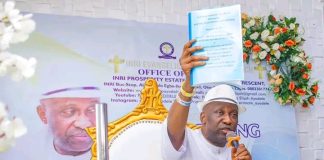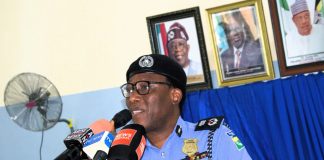[ad_1]
WITH so many worrisome things going on in the country – a sudden jack up in the pump price of PMS from under N700 per litre to between N850/litre and N1,400 per litre depending on the area (barely a month after the hunger-driven #EndBadGovernance protest), the return of punishing queues at petrol stations and a largely despondent and cowed citizenry, it makes sense to seek escapism from it all.
Coincidently, today, Tuesday, September 10, 2024, is the day of the first debate between Republican Presidential candidate Donald Trump and his Democratic Party counterpart, Kamala Harris. It is a debate that could potentially re-define the trajectory of the presidential race, providing another justification to ‘journey to America’.
So far the general consensus is that it will be a close race. As of September 8, 2024, the New York Times’ national polling average had Kamala Harris ahead with 49% points against Trump’s 47%. Both candidates are competitive in key battle ground states like Pennsylvania, Wisconsin, Nevada, Arizona and North Carolina. Based on the aforementioned polling figures, the difference between the two is statistically insignificant and within the margins of error.
Though Kamala Harris still leads in most of the polls, it would seem that the bounce from the Democratic National Convention, the powerful endorsements by Democratic bigwigs like the Obamas, Clintons and Nancy Pelosi, and the novelty of her emergence as the Republican candidate, have begun to cool off. But she received a boost recently (which is not yet reflected in most of the polls) when Professor Alan Lichtman picked her to win the race.
Professor Lichtman, 77, a Professor of History at the American University in Washington DC, who is dubbed the “Nostradamus” of US presidential elections, had accurately predicted the outcome of all but one (George W Bush v Al Gore in 2000) presidential elections since 1984. Professor Lichtman predicted that Kamala Harris was on course to win the November poll despite the fact that Democrats had, with Biden stepping aside from the race without resigning from being president, surrendered the valuable key of presidential incumbency – one of the 13 keys he uses to determine the outcome of presidential elections.
The “keys” are a set of true/false propositions that does not take into account polling trends. Of his 13 keys, Professor Lichtman, who is also competing in the qualifying race for the 2025 national senior Olympics in the US, found that eight favoured Harris. Lichtman’s reputation as a Nostradamus of presidential election prediction was given a tremendous boost when he accurately predicted that Trump would win the 2016 presidential election at a time most of the polls had it sealed for Hillary Clinton. Will he also be correct this time around?
This year’s election is unprecedented in America’s presidential history. For the first time, a woman is the candidate of a major political party which raises an important question (though discussed in hush-hush tones because of political correctness) of whether American voters are now prepared for a female president. There is also the matter of whether Americans are ready for another Black President. Under America’s ‘one-drop rule’, Kamala Harris is Black. The ‘one-drop’ rule was a legal principle of racial classification in the 20th-century United States under which a person with even one drop of blood in the person’s ancestry is considered Black (Negro or coloured in historical terms).
Kamala Harris’ father was Jamaican and her mother Indian. The fear when a Black candidate runs against a White candidate is the so-called ‘Bradley effect’. This was named after Tom Bradley, an African-American candidate who lost the 1982 California gubernatorial race despite having a massive lead in the polls going into the election against a White candidate. Adherents of the ‘Bradley effect’ believe that some White voters will often lie to pollsters that they are undecided or likely to vote for a minority candidate for fear of being accused of racism. This means that for Kamala Harris, there is potentially a double whammy – being Black and being female.
How do both candidates frame each other? Democrats have successfully framed Donald Trump as an existential threat to American democracy. He is profiled as someone who lies chronically and repeatedly, an ex-convict, and someone who would go all out to jail his political opponents. He is also portrayed as someone who would further mainstream right-wing political philosophies and of being inconsistent in his political beliefs – having shifted political affiliations, like Nigerian politicians, five times since he first registered as a Republican in 1987.
For instance, in 1999, he changed his party affiliation to the Independence Party of New York; in August 2001, he changed it to Democratic; in September 2009, he changed it back to the Republican Party; in December 2011, he changed to “no party affiliation”, but in April 2012, he again returned to the Republican party. These inconsistencies have led to his critics accusing him of being in politics just for himself.
Though Trump seems to be shifting his political position to the centre of the right during the campaigns to broaden his appeal beyond his traditional base, essentially Whites without college qualifications, he appears to struggle to stay on that political spectrum. People who admire him however talk of his authenticity – he says what he means – even if it is utterly unpalatable to his listeners. His Making America Great Again, MAGA, mantra appeals to a base that is suspicious of immigration, trade competition with China and America’s engagements overseas and relatively huge contributions to international institutions. He is also hugely popular with evangelical Christians who loathe what they regard as the erosion of the country’s Christian values, such as the legalisation and apparent promotion of same-sex marriage under the Democratic governments of Obama and Biden.
Harris benefits from a fear of a Trump Presidency – which is one of the primary drivers of her candidacy. One of the biggest criticisms against her candidacy, however, is the vision thing – she has been accused of being unable to layout her vision of the country succinctly. Even in the CNN interview she held with her vice presidential nominee Gov. Tim Walz on Thursday August 29, 2024, she was thought to be too cautious and unable to succinctly present any grand vision of her plans for America. She has also been accused of having poor messaging skills, especially when the parameters are wide. One major explanation for this could be the suddenness of her emergence as a Democratic candidate – which gave her some bounce but also embodied some disadvantages for her.
It is generally believed that politicians who rose to prominence as governors or spent a good number of years in the Congress are better at articulating their political messages since they would have spent years honing such skills while in office. Doubts have also been expressed on whether she will be able to reverse the Democrats’ growing weakness among working-class voters—most particularly, the white working-class voters who have been trending Republican for a very long time.
The debate, which starts at 9 p.m. Eastern Time, could be a game-changer. A self-inflicted harm in the debate by either of the candidates could alter the trajectory of the race. There is however also the ‘October surprise’ or what military strategists would call the ‘fog of war’. This means that whatever may be the outcome of the debate, there could still be a variable missed by all analysts which could turn up late in the race (hence ‘October surprise’) and become the ultimate game-changer.
*Jideofor Adibe is Professor of Political Science at Nasarawa State University, Keffi.
The post America on my mind, by Jideofor Adibe appeared first on Vanguard News.
[ad_2]
Source link














